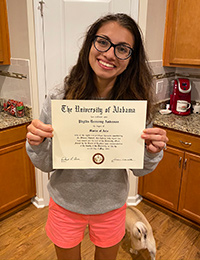 After earning her bachelor’s in Elementary Education from Winthrop University, Phyllis Anderson began teaching in South Carolina’s Title I schools. She taught second grade for a year. Then, in her second year, she moved to a new school and transitioned to teaching in a third grade classroom – and learning in an online classroom! Through The University of Alabama’s 100% online program, Phyllis was working toward her master’s in Educational Psychology.
After earning her bachelor’s in Elementary Education from Winthrop University, Phyllis Anderson began teaching in South Carolina’s Title I schools. She taught second grade for a year. Then, in her second year, she moved to a new school and transitioned to teaching in a third grade classroom – and learning in an online classroom! Through The University of Alabama’s 100% online program, Phyllis was working toward her master’s in Educational Psychology.
“I wanted to make sure I could find a program that fit with my schedule, and I didn’t want to drag it out either. I wanted to be able to get it done as quickly as I could while still being able to work,” Phyllis said. She found UA’s online program to be a good fit for her needs and noted that the Learning and Assessment concentration really helped it stand out.
 The coursework provided her with helpful strategies she could immediately apply to her classroom. “We always have professional development in the school districts, and I would have all of these aha moments where I would think, ‘I’ve heard this before!’ It was especially helpful for looking at data and grouping students for reaching their highest potential.”
The coursework provided her with helpful strategies she could immediately apply to her classroom. “We always have professional development in the school districts, and I would have all of these aha moments where I would think, ‘I’ve heard this before!’ It was especially helpful for looking at data and grouping students for reaching their highest potential.”
For her Capstone project, Phyllis evaluated and analyzed a program called Pet Buddies. Once a month, a local shelter would bring pets in to teach students about how to care and nurture for a pet. As part of her project, Phyllis analyzed student writing samples and journal entries related to Pet Buddies. “It was really fun and engaging to write about. It was great to see these kids — many who are from high poverty areas — apply what they learned about caring for pets and how that translates to being a friend over being a bully,” she said.
 Another class project that had an impact on her career was the evaluation she completed on Reading Partners, a literacy program offered in her district. As part of the assignment, she evaluated the effectiveness of the program in her school, and she has actually accepted a new role for Fall 2020 in which she’ll be leaving the classroom to take leadership of the program at her old school. “Learning how to analyze the data and to know what to look for to see how it has impacted our school, and then sharing that with some of the program heads definitely gave me a leg up in being selected for this new position,” she said. In her new job, Phyllis will be working with K-5 students and focusing solely on literacy. “I’m excited to move into this leadership role and to be able to grow in my career. I’m also excited to see my old students and be able to work with them again.”
Another class project that had an impact on her career was the evaluation she completed on Reading Partners, a literacy program offered in her district. As part of the assignment, she evaluated the effectiveness of the program in her school, and she has actually accepted a new role for Fall 2020 in which she’ll be leaving the classroom to take leadership of the program at her old school. “Learning how to analyze the data and to know what to look for to see how it has impacted our school, and then sharing that with some of the program heads definitely gave me a leg up in being selected for this new position,” she said. In her new job, Phyllis will be working with K-5 students and focusing solely on literacy. “I’m excited to move into this leadership role and to be able to grow in my career. I’m also excited to see my old students and be able to work with them again.”
Phyllis graduated in May 2020, less than two years from her start date. She said the last semester was especially challenging because of the effects of COVID-19 in the U.S. “I was teaching remotely and writing my Capstone project and taking another class online. I felt like I was at the computer 24/7!”
Already moving her career along in her new leadership role, Phyllis is thankful for the master’s program and its engaged faculty. “Whenever I had questions about classes, they were always quick to get back to me. It was really cool to me that they were able to build those relationships even though everything was online. It was a great experience.”
Published: September 4th, 2020

